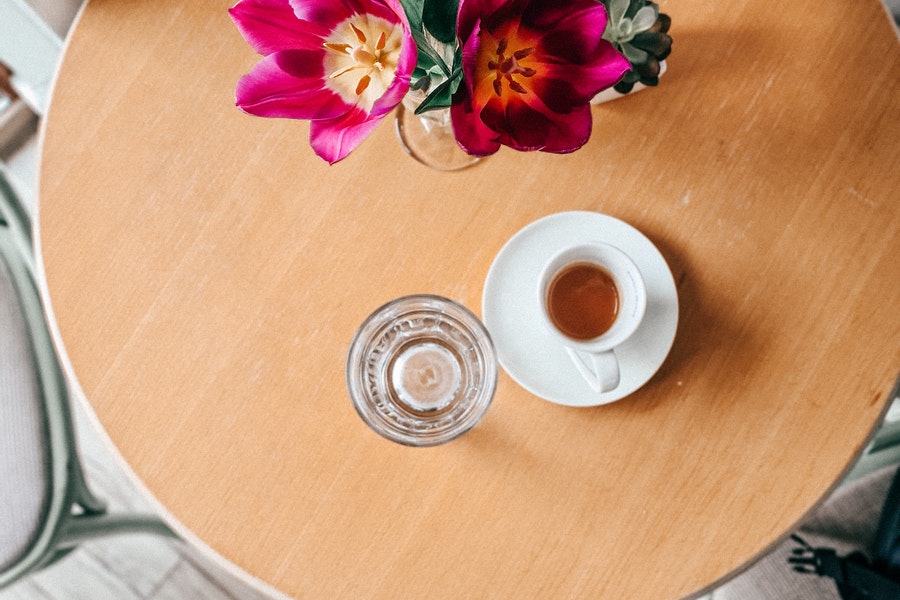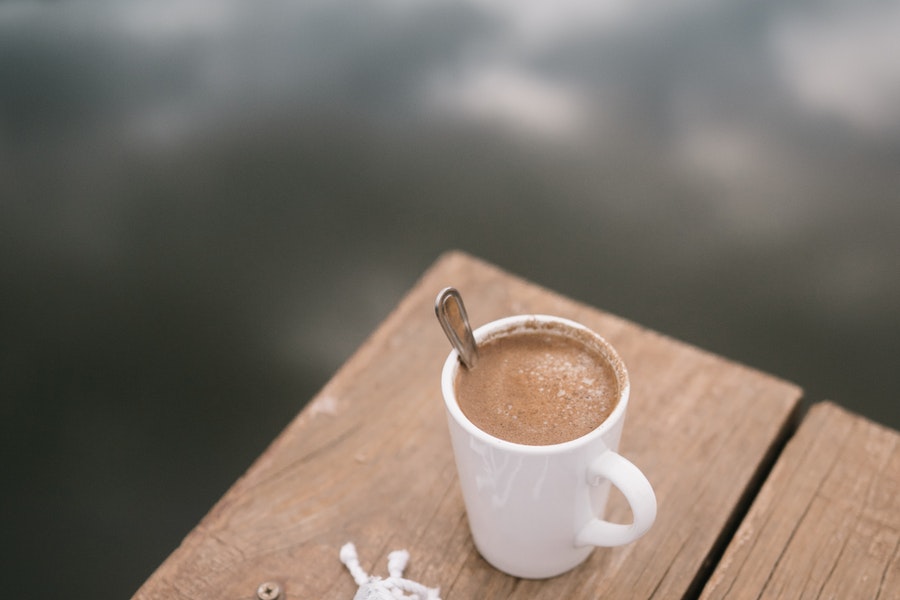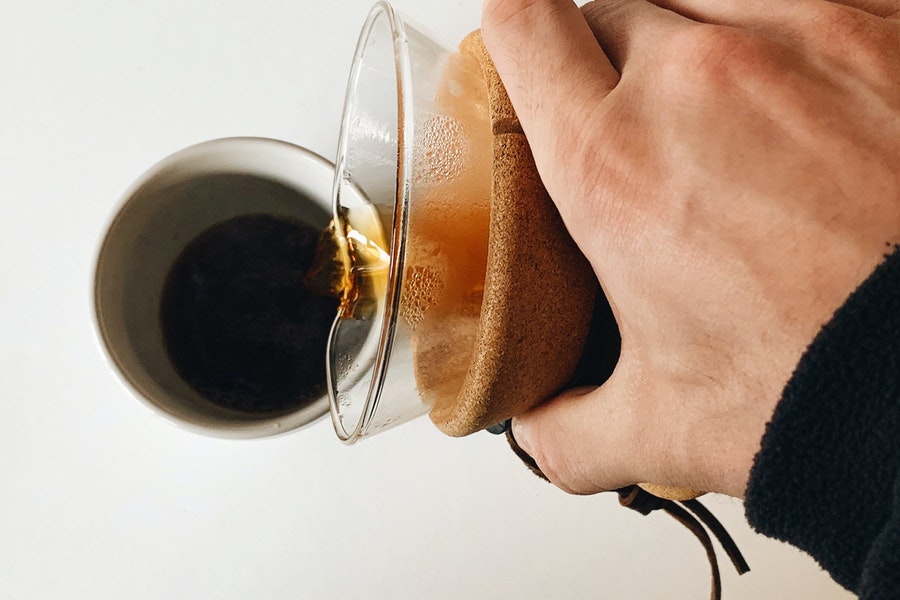If you switch to decaf coffee, you might not initially like the taste. While it can be nice to reduce the amount of caffeine you’re having, you might wonder why it doesn’t taste the same as regular coffee. So, why does decaf coffee taste different?
Contents
Why Does Decaf Coffee Taste Different?
Decaf coffee tastes different compared to regular coffee because the process of removing caffeine from coffee beans alters its natural taste. To remove the caffeine, coffee beans need to be soaked prior to getting roasted, and this impacts the flavor.
While decaf does have some bitter notes from the roasting process, these will be less intense than those found in regular coffee. There is no “burn” or “bite” when drinking it since there are far fewer compounds that can cause such sensations (less caffeine). Another common complaint about decafs is that they lack complexity due to their milder nature.

Decaffeination Methods and How They Impact Flavor
There are several methods of decaffeinating coffee and they all affect the final taste in unique ways:
The CO2 Process
The CO2 method uses pressurized carbon dioxide to extract the caffeine from coffee beans. The process involves soaking steaming beans in compressed CO2 where activated carbon filters remove the caffeine from the coffee. The CO2 decaffeination process doesn’t remove all the caffeine in your coffee, so its flavor is more desirable than other decaf coffees.
The Swiss Water Process
The Swiss Water Process uses water and osmosis to remove caffeine from green beans. This method of decaf-making involves soaking your unroasted coffee in hot water for several hours until all caffeine leaks out. Prolonged soaking of coffee in hot water weakens its flavor.
There are other ways to decaffeinate coffee that rely on solvents such as Methylene chloride and Ethyl Acetate. These methods remove 90% to 99% of the caffeine from regular beans, leaving behind a flavor and aroma affected by the solvents.
Certain factors like the age of the bean or even temperature during roasting may also influence how much flavor remains in your cup after decaffeination.
Changes in the Coffee Bean Flavor
The decaffeination process significantly weakens and alters the coffee flavor. Certain factors like the age of the bean or even temperature during roasting may also influence how much flavor remains in your cup after decaffeination.
C02 Decaffeinated Coffee Is Bitter
C02 extraction is the most common process for removing caffeine from coffee beans. The C02 extraction process typically leaves coffee with a bitter taste because it strips out fewer flavorful coffee components than other methods.
Solvents Compromise Taste
Methylene chloride methods extract more caffeine from your beans, at a price! It strips flavor along with caffeine. Some people think this chemical leaves a chemical residue that contributes to the bland taste of caffeine-free coffee.
Decaffeinated Beans Are Prone to Oxidation
Decaf coffee processing also leaves coffee beans more vulnerable to oxidation which can damage the coffee flavor and smell compounds over time. Oxidation can alter the flavor and aroma of food, including caffeine-free coffee. In addition, oxidation in food can cause health issues like cancer and heart disease.
How do you prevent coffee oxidation? Don’t leave your pot sitting on the stove for hours after brewing. You should take it within 20 minutes of brewing for maximum freshness!
Decaffeinated Coffee Tastes Burnt
Decaf coffee beans require prolonged roasting to bring out the flavor. Decaffeinated coffees tend to be slightly darker roasted than their caffeinated counterparts. This dark-roasting can add bitterness to a cup of decaf coffee that doesn’t exactly go down smoothly with some people who prefer lighter roasts.

Brewing Tips for Better Tasting Decaf Coffee
Here are a few tips to make better decaf coffee at home.
Use Freshly Roasted Beans
Decaffeinated coffee uses green coffee beans, which means that you decaf before you roast them. Take the Swiss water process, for example, where you have to soak coffee in water for hours to strip out caffeine. In this case, the flavor of caffeine-free coffee tends to be better when you use fresh beans rather than older ones.
Your coffee will taste much better if you grind up your own coffee right before brewing it instead of using pre-ground stuff from the grocery store or diner down the street! Freshly ground coffee has a fresher aroma and will help make up for what gets lost during decaffeination.
Use Filtered Water Rather Than Hard Water
It doesn’t matter whether you’re drinking regular or decaf—you should always use filtered water when brewing coffee. Hard mineral content can negatively affect both types’ taste profiles by altering their pH levels and other chemical properties like Total Dissolved Solids concentration levels.
For example, if someone were to use tap water, their cup might taste more bitter than usual due to increased amounts of iron found within their DCCs. Contamination, even in trace amounts, would make matters worse for someone who suffers from migraines and other health issues such as hypertension.
Use Arabica Beans
Arabica beans have lower caffeine content, and they also have a smoother taste. They’re also more expensive than other beans, so this might not be the right choice for you if you’re on a budget.
For caffeine-free coffee, you’ll want to avoid using Robusta beans. These beans contain more caffeine than other varieties, so they may not be ideal for decaffeinated coffee. If you’re looking for a strong flavor, Robusta beans would be good for regular coffee.
Related Questions
Can Decaf Coffee Taste as Good as Regular?
Decaffeinated coffee does not taste as good as regular coffee. While caffeine-free coffee can taste somewhat similar to regular coffee, it completely lacks the same flavor that makes you want to drink more and more cups.
So while decaf might be good enough for those who need their fix without getting jittery, it’s just not satisfying enough compared to its caffeinated counterpart.
How Do You Make Decaffeinated Coffee Less Bitter?
The most straightforward way to make decaffeinated coffee less bitter is by using less coffee. Decaf beans are only 97% caffeine-free, meaning they still contain a bit of caffeine and other substances that can contribute to bitterness. The more coffee you use in your brew, the more bitter it’ll taste.
Another approach is to use a coarser grind. The smaller the grinds, the stronger and more intense tasting your drink will be. You can also try using filtered water or brewing at lower temperatures (less than 200°F). If all else fails, consider switching up your brewing method altogether and opting for a French press or pour over with a Chemex instead!
What Are the Side Effects of Decaf Coffee?
With decaf coffee, you may still experience headaches, heartburn, or acid reflux. Some people have sensitivities to certain chemicals used during the decaffeination process and naturally occurring compounds in coffee beans, such as trigonelline and caffeic acid.
Conclusion

When you drink decaf, you’re drinking a beverage with the caffeine removed from it. Your decaffeinated coffee tastes different because it has no caffeine. The decaffeination process also impacts the flavor of your coffee. The removal of caffeine from coffee can vary from one brand to another – most methods involve soaking the beans in water or using an organic solvent.


